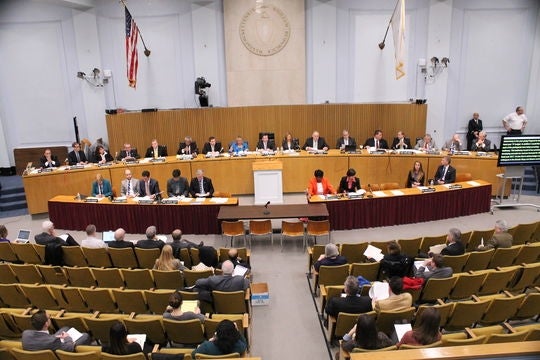Several experts pegged the likely growth of tax revenues in fiscal 2017 at less than 4 percent, citing drags on the economy from an aging workforce and relatively scarce housing combined with an expected further decrease in the income tax rate.
At the annual hearing on revenues Wednesday that kicked off the annual appropriations process, lawmakers heard a range of projections on the availability of tax revenues for fiscal 2017 budget-building purposes. The estimates came in as low as 3.2 percent and as high as 5.6 percent.
The Massachusetts Taxpayers Foundation predicted revenues will increase by about $980 million, or 3.8 percent, in the 12 months starting July 1, 2016. The Beacon Hill Institute at Suffolk University predicted revenue growth in fiscal 2017 of 5.6 percent over the current fiscal year. The Department of Revenue predicted growth of between 3.8 to 4.2 percent in fiscal 2017.
Alan Clayton-Matthews, an economist who is co-editor of Massachusetts Benchmarks, predicted 3.2 percent growth. “That’s not strong growth,” Clayton-Matthews told members of the House and Senate Ways and Means Committee who listened and asked questions in Gardner Auditorium Wednesday.
Budgetary spending is fueled by tax receipts as well as fees and federal funds.
Michael Goodman, co-editor with Clayton-Matthews of Massachusetts Benchmarks, said local zoning ordinances hamper housing growth, the population is graying and electricity bills are eating into income gains secured through increases to the minimum hourly wage and the earned income tax credit.
“It’s not exactly uplifting to hear some of this,” Senate Ways and Means Chairwoman Karen Spilka said after hearing from the economists.
House Ways and Means Chairman Brian Dempsey after the hearing said new taxes are “not on the table” for the fiscal 2017 budget.
Massachusetts Taxpayers Foundation President Eileen McAnneny said her group “tends to err on the side of caution” in formulating a revenue projection. In four of the past six years, she said, the MTF forecast has been closest to the number ultimately chosen for a consensus revenue estimate, differing by a little over $10 million on average.
The foundation’s fiscal 2017 estimate of $26.69 billion in revenues draws on an increase in wages, which would bring about higher income tax revenues. McAnneny cautioned, however, that an aging workforce will lead to a period of limited job growth in Massachusetts starting in the 2017 fiscal year, which could ultimately hinder economic growth and tax revenues as baby boomers retire and reduce consumption.
The Massachusetts Tax Foundation reported the 3.8 percent growth projected in fiscal 2017 is lower than the five-year trend of 4.6 percent growth. For fiscal 2016, the foundation projects $25.71 billion in tax revenues, which is $100 million higher than the current benchmark.
According to the foundation, the automatic slight drop in the income tax rate, an expansion of the earned income tax credit and projected decline in capital gains tax revenues in 2017 all slowed the projected revenue growth for that year.
Following an economically-triggered statutorily-mandated drop to 5.1 percent in January 2016 the income tax rate may fall again in January 2017 to 5.05 percent. Both the earned-income tax credit, a benefit for working low-income people, and the assumed income tax rate decrease in January 2017 are expected to reduce fiscal 2017 tax revenues by about $75 million each, according to the foundation, which relied on a Department of Revenue estimate.
Both the Massachusetts Taxpayers Foundation and the state Department of Revenue flashed warning signs over the impact world affairs can have on the state’s revenue, pointing to economic slowdowns in Europe and China, global threats of terrorism and unrest in the Middle East.
“We would just say proceed with caution,” McAnneny told the News Service. “There are a lot of signs in the global economy and the national economy that things are slowing.”
Revenue Commissioner Mark Nunnelly said global conditions create “major sources of uncertainty” and potential risk to economic growth. Capital gains tax revenue is also difficult to predict, he said.
Nunnelly anticipated increases in income and sales tax collections, driven by growing rates of retail sales and higher wages, salaries and personal incomes.
The Beacon Hill Institute’s 5.6 percent projected revenue increase for the 2017 fiscal year is “more optimistic than the rest” and based primarily on income and sales taxes, said Paul Bachman, the institute’s research director.
Bachman said the state’s economy would also be aided by “pretty solid” job growth and lower fuel and gasoline prices.
A budgetary shortfall is shaping up in the current fiscal year and Administration and Finance Secretary Kristen Lepore said it will likely be addressed after the holidays. Lepore began her tenure as Gov. Charlie Baker’s budget chief by working on legislation to snap the fiscal 2015 budget into balance.
In October Lepore projected a $145 million shortfall in non-tax revenues and the administration has been tracking at least $250 million in spending exposures to the $38.1 billion fiscal 2016 budget.

